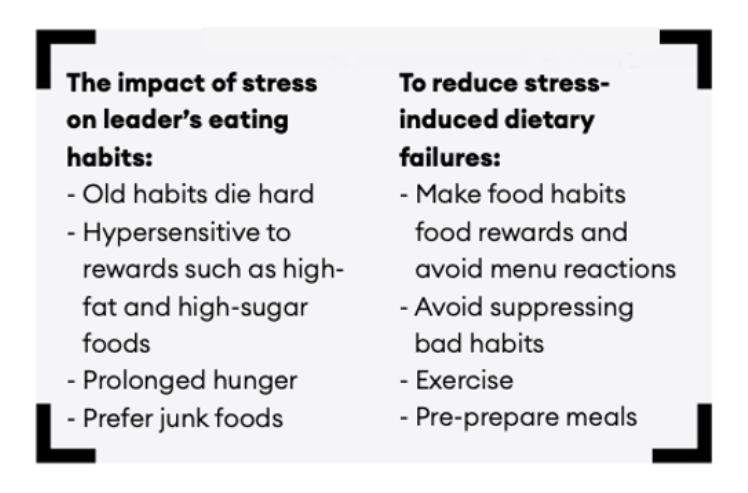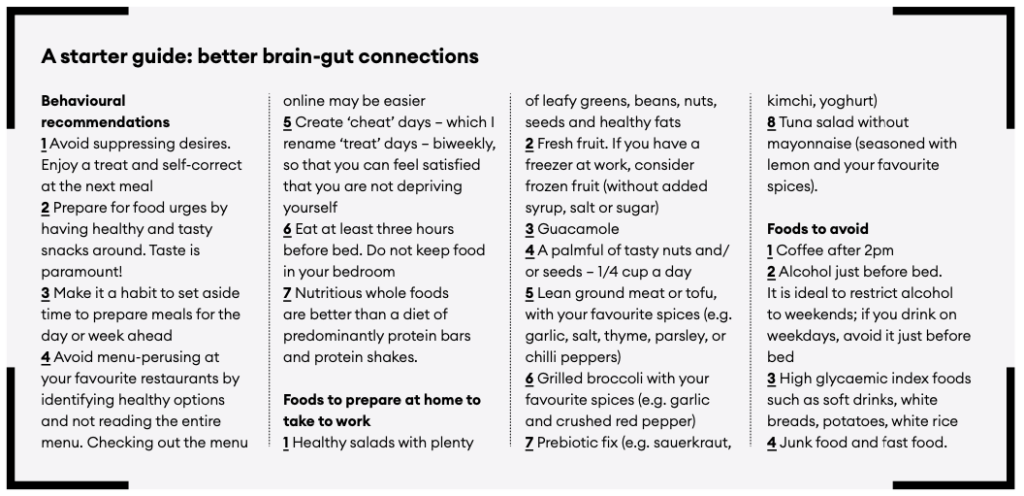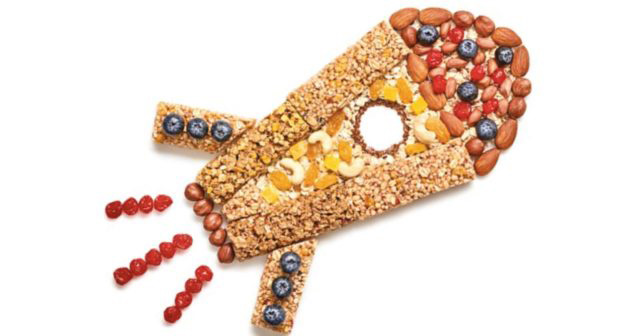Leaders can optimize their energy and resilience by eating the right foods.
On a day-to-day basis, your gut may be the furthest thing from your mind. But in a quite literal way, as an increasing body of scientific research now shows, it is connected to your mind in profound ways.
In anatomical terms, the brain and gut are connected via the vagus nerve (VN). The VN is able to sense the breakdown products of gut bacteria microbiota and to transfer this information to the brain. Your brain can respond by reducing inflammation and decreasing the gut’s permeability, inducing changes in your gut bacteria. However, stress inhibits the VN, disrupting the flow of information.
“So what?,” you may ask. Well, it means your gut bacteria changes as a result of stress. The signals which reach the brain (and flow back to the gut) are changed. Mood, thinking, energy, sleep and even the body’s immune response – all of which are determined by the brain – are impacted. The good news is that gut bacteria can be changed by diet – and this, in turn, can improve all of those factors.
Minimizing stress and anxiety
We often use the terms ‘stress,’ ‘anxiety’ and ‘fear’ interchangeably but, biologically, researchers make distinctions. A stress response occurs in the body when something challenges the regular and balanced operation of the body, and the body goes into emergency mode. When, in this emergency mode, you perceive that a threat is imminent, you enter a state of anticipation called anxiety. When you respond to a perceived threat, that response is called fear.
For example, if you are a stockbroker, a sudden fluctuation in the stock market causes stress. When you foresee that this may not resolve well, it causes anxiety. And when your investors start pulling their money out, you respond with fear. Stress, anxiety and fear are all a daily part of leaders’ lives – and against a backdrop of Covid-19, tense race relations and volatile markets, they can rule the day. You might think that this is all in a day’s work, and it often is, but how you prepare your body for these situations matters. What you eat is a critical part of that preparation.
However, here’s the rub: stress makes it difficult to eat more healthily. That’s because stress makes habits harder to break. When you’re stressed, your brain becomes hypersensitive to the rewards of tasty, high-fat and high-sugar foods. As a result, you seek these foods and enjoy them more than ever; it’s hard to stop eating too. In fact, prolonged stress, such as being in quarantine, increases cortisol, which in turn increases the sensation of hunger and can result in your body starting to prefer junk foods.
Josue, a leader I coached, was in the habit of coming home late and eating his saved dinner plate alone, washing it down with two glasses of red wine. After a long, hard day, he looked forward to taking that deep breath. The result was that he ate ravenously. Before his satiety receptors could register that he had eaten, he was reaching for the cookies and chocolate in the kids’ snack cupboard. Although he exercised regularly, he came to me anxious and fatigued, experiencing disrupted sleep and a frequent feeling of sluggishness. Stress and poor sleep were disrupting Josue’s hunger hormones, leaving him unable to ‘shut off ’ the hunger switch, even after dinner.
Breaking his food habits demanded some lifestyle changes. He shifted his routine to arrive home earlier and eat dinner with his family, which was done mindfully – actually spending time with them, not checking messages on his phone as he ate. He started bringing lunch and healthy snacks to work and using mindfulness practices throughout the day to help lower his stress. He began to slowly reverse the damage to his microbiome. He showed marked improvement in what he called “feeling less angry at home” – he lost weight, began to sleep better, and his energy returned.
Recommendations for leader stress
Stress has a profound impact on our eating habits: we rely on old habits, we become hypersensitive to high-fat/high-sugar rewards, we feel prolonged hunger, and we prefer junk foods. Target these factors with four key steps:
1. Turn food habits into food rewards
Your brain’s default will be to follow old habits like eating office snacks or ordering take-out. While this is human, make this your weekly treat meal rather than your daily habit. In the place of those unhealthy foods, follow the usual principles of diet change: a healthy whole foods diet includes fiber-rich foods such as whole grains, fruit, vegetables, beans, legumes, nuts, seeds and healthy fats.
2. Avoid suppressing bad habits
Forcibly telling yourself not to eat unhealthy foods will backfire – that’s just how the brain works. Rather, focus on increasing the healthy and tasty options around you: avocado (or guacamole) provides healthy fats, while a palmful of cashew nuts is a healthy way to abate that mid-afternoon hunger pang.
3. Exercise
Physical activity can reduce your hunger and regulate your appetite. Not everyone has the same response to exercise but, in general, it is likely to be helpful. If you’re hungry afterwards, a healthy protein shake is a good option.
4. Pre-prepare meals
Junk food, fast food, processed food, white flour, sugar, maple syrup, honey, and agave nectar contribute to obesity. Avoid fast food by pre-preparing your meals. Make this a compulsory slot in your home schedule.

How leaders can improve their immunity
Psychological stress can damage the immune system, because the majority of immune cells in the body are found in the gut. All cells need adequate nutrition to function well and immune cells are no exception – so to promote good health, tackling stress is a first order concern. You may not be able to change the stressors you face, but you can be deliberate about changing your response.
How the system works is that when food arrives in the gut, it interacts with your gut bacteria. These bacteria provide signals to immune cells in the gut’s lining, so that if any foreign antigens are in the food, your immune cells can attack. If you want well-trained soldiers in your immune defenses, a healthy gut microbiome is a must.
Consider Asha, another leader I coached.
She complained of a feeling of ‘brain fog’ and had recently developed a skin rash. It became clear she was not getting enough whole foods in her diet. She had been promoted at work, was traveling more, inhaling quick airport meals and fast food, and feeling increasingly stressed. We worked on a personalized nutritional psychiatry meal plan, including foods made for travel such as pre-prepared fruit and veggies, helping cut out late-night sugary snacks. She started to pack mini sachets of almond butter, picked up celery and hummus for her bar fridge, and added healthy sides whenever she ate out. She stuck to lean proteins or fish with a side salad and vegetables. I challenged her: how many different colors of fresh vegetables could she add in a day? This made a game out of dietary change: she would compete with herself and began increasing the biodiversity of her foods, making her gut healthier and happier. The brain fog lifted, and her skin rash began to fade, without medication.
Recommendations for leader immunity
1. Use probiotics
Probiotics are live microorganisms, which, in adequate amounts, can confer health benefits on the host. They can improve immunity by having positive effects on allergies and viral infections by impacting your genes, immune cells and gut lining. While you can find probiotics in tablet form, you can also find them in fermented foods like yogurt, kefir, miso, sauerkraut, kimchi, kombucha tea, kefir, tempeh and gouda, mozzarella, cheddar and cottage cheese.
2. Use prebiotics
Prebiotics are broadly defined as a non-digestible fiber which can be digested by gut bacteria through fermentation, promoting the health of the gut biome: here, rather than eating fermented products, you eat products that can be fermented by your gut bacteria. Find prebiotics in leeks, asparagus, onions, wheat, garlic, chicory, oats, soybeans, and Jerusalem artichokes. If this feels like a list of ‘weird’ foods, just think “delicious soup”: for instance, combining onions, leeks, garlic and asparagus, which can be served warm or chilled. These make for great prepare-at-home options.
3. Include dietary fiber
Dietary fiber can boost immunity. This one is easy, as it’s present in beans, legumes, fruits, vegetables, seeds and nuts.
4. Seek out vitamin E
This can only be obtained through the foods we eat or a supplement. It can have many positive effects on your body such as preventing cell damage by acting as an antioxidant, and promoting healthy cell signalling and enzyme activity, which promotes good levels of life-enhancing cellular processes and the breakdown of the toxic by-products of normal metabolism. Food sources of vitamin E include nuts, such as almonds and hazelnuts, seeds and green leafy vegetables.
Finding what works for you
Every person is different – genetically, culturally, metabolically – so there is no one-size-fits-all diet. Shifting lifestyle, not just diet, is critical: you can’t go from unhealthy eating to a restrictive diet in one day and expect it to last.

My grandmother used to tell me: “Eat your vegetables and make sure you sleep well when you are studying – if not, you won’t excel!” This was a woman who raised a family of 11 children – children who grew up to become six doctors, four school teachers, and a dentist. In addition to her being a great mother and grandmother, after years of study in the science of nutrition, I can confirm: she was absolutely right about the link between nutrition, sleep and success.
Every leader needs guts to succeed: in a complex, stressful world, you owe it to yourself to give your gut everything it needs to be healthy.
–Dr. Uma Naidoo is the director of nutritional and lifestyle psychiatry at Massachusetts General Hospital. Dr. Naidoo’s expertise is featured in Duke CE’s new masterclass, “From Resilience to Antifragility: Perspectives from Brain Science.”



